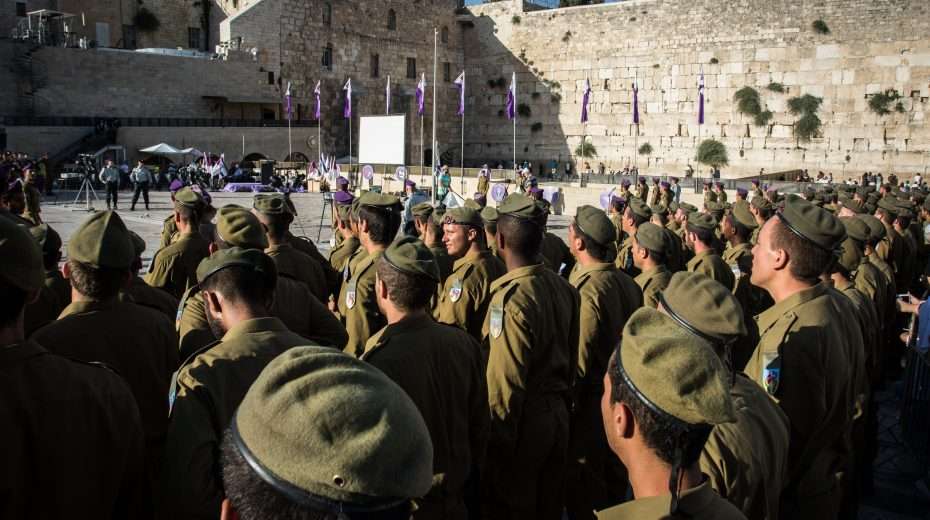Every Warrior Is a Sacrifice
The Hebrew Bible word play on war and sacrifice, and the connection to Jesus and defending the Land of Israel in our day
 Swearing-in of IDF soldiers at the Western Wall, each one a living sacrifice
Swearing-in of IDF soldiers at the Western Wall, each one a living sacrificeSacrifice is a central theme in the Bible. It mediates between man and God. This concept is not only recognizable by the ritual and spiritual motifs of Scripture, but is even found in the Hebrew root of the word.
While watching a satire on TV recently, a new thought occurred to me related to the Hebrew word for “sacrifice.” The skit was about the biblical king Ahaz, who wanted to convince his son not to join his army as a warrior.
“At that time Rezin, king of Syria, and Pekah, the son of Remaliah, king of Israel, went up to battle against Jerusalem and besieged Ahaz, but could not take the city by storm.” His son pleaded, “Father, let me fight with the army.”
Today in Israel, parents who have only one son must give special consent for him to join a combat unit. One would like to avoid, if possible, that the only son of the family dies in battle. The TV satire targeted this contemporary practice.
The Hebrew word for fighter or warrior is keravi (קרבי), but Ahaz’s son used a different word, mekorav (מקורב) and this would roughly mean “sacrificed one” or “victim.” “Father, like all my classmates, I also want to be a victim (combatant) in the war against our enemies. I don’t want to be an overseer in your army like Mama wants, I want to serve my homeland as a casualty on the front lines.” This is a play on the Hebrew language, leading to new thoughts on how the biblical term leads to “sacrifice.”
The biblical term for sacrifice is korban (קרבן) and it comes from the Hebrew word root karev (קרב), which translates to “near.”
In this sense, the words sacrifice, combatant and victim all come from the same Hebrew root for the term “near.” Through sacrifice man comes closer to God. Victims can worship God, appease anger, express thanksgiving, or repentance. In special cases, the Bible uses other terms such as olah (עלה) for burnt offerings, mincha (מנחה) for grain offerings, zebach slamim (זבח שלמים) for peace offerings, chattat (חטאת) for cleansing offerings, and asham (אשם) for trespass offerings.
Every year Israel commemorates its fallen soldiers and the victims of terror
The one who makes a sacrifice to God draws nearer to Him in the ritual. The Israeli soldiers serving in combat units are literally sacrificing their lives for the homeland of Eretz Israel. Fully conscious, these soldiers are ready to lay down their lives in defense of the Promised Land. They are willing sacrifices who may have to pay the ultimate price in battle.
Battle is called kerav (קרב) in Hebrew and comes from the same root. Warrior, battle, sacrifice and victim are thus part of the full biblical picture of sacrifice. Whoever falls in battle and thus sacrifices his life comes closer to God in the sense of the Hebrew word.
We make sacrifices to achieve important goals in life either for ourselves or the nation as a whole. Next month the people of Israel will celebrate their 74th Independence Day. Since the founding of the state, around 24,000 Israelis have sacrificed their lives in defense of the country. Almost one death per day so that the people of Israel can live in peace and security. Blood must be shed for this, and blood belongs to the sacrifice.

From an Israeli point of view, the biblical term has a topical meaning even in our day. Death is part of life. In order to live, Israelis must sacrifice, even to the point of laying down their own lives. This is a formula that we may not like, but unfortunately it is our reality.
At the same time, this is also the basis for salvation. Doesn’t it say in the Gospel of John, “For God so loved the world that he gave His only Son, that whoever believes in him shall not perish but have eternal life”? Jesus died voluntarily out of love for mankind and then rose again. Israeli soldiers sacrifice themselves voluntarily in battle out of love for their people and country. Of course, I don’t want to equate Israel’s soldiers with Jesus, I just want to point to the Jewish concept of sacrifice as the basis for New Testament redemption.
And in sacrifice we are all connected. Relatives, k’rovim (קרובים) in Hebrew, also comes from the same Hebrew root that leads to sacrifice. Faith in Jesus unites, but also defending the Land of Israel unites people and makes us one body.
No comments:
Post a Comment